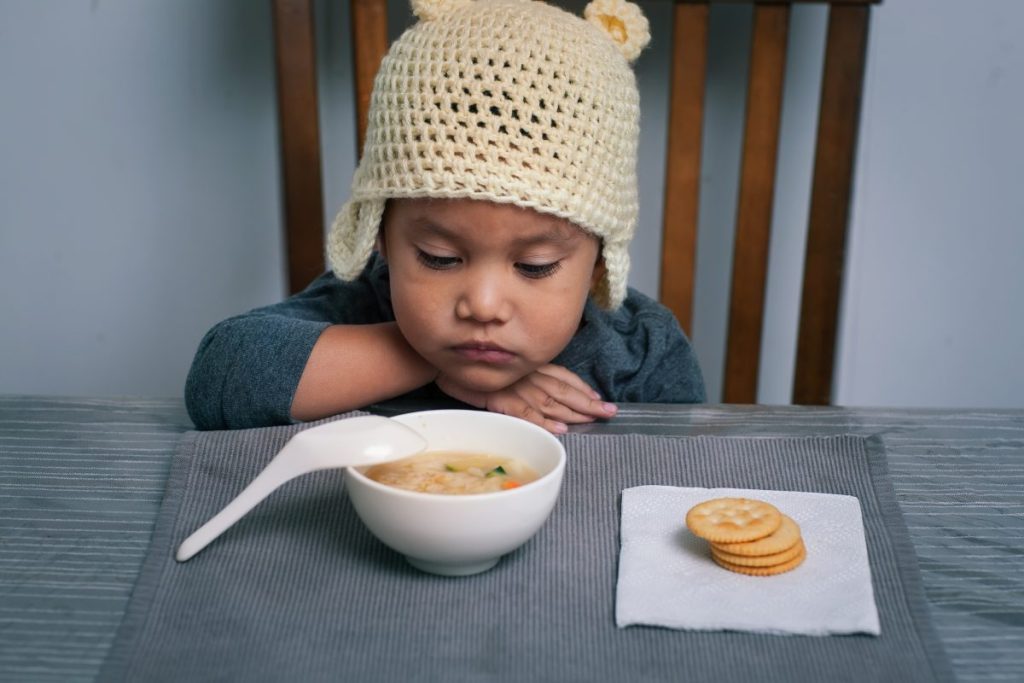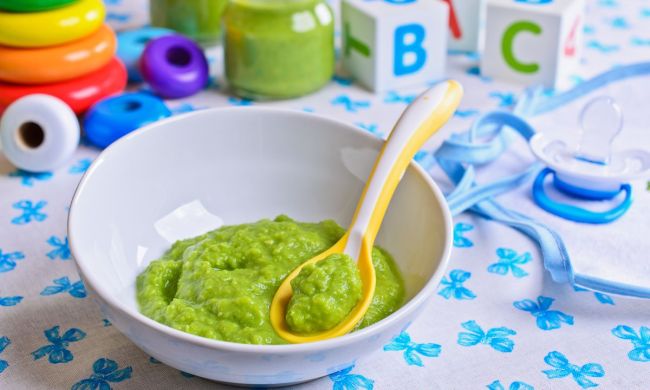Toddlers are typically full of energy and giggles, so it can be hard for parents when their normally happy, boisterous, and active little one feels under the weather. Whether it’s cold and flu season or your toddler came home from a playdate with a bug, knowing what to feed a toddler with a fever can be a challenge for even the most seasoned parent.
Although fevers are a pretty common occurrence during toddlerhood, especially if they’re in a daycare or preschool setting, they can still make your child pretty miserable. So, while you can’t make your child’s fever magically disappear, there are some foods to give to help your little one feel better and keep that strength up. Here’s what to feed a toddler with a fever, as well as some foods that you may want to avoid.

Fever basics for a toddler
Although it’s scary when your toddler comes down with a fever, it’s pretty common. Nemours writes that one fever a month is normal for children of toddler age, especially if they are routinely around other children or older siblings, which increases the likelihood of exposure to germs and infections. Often, medication isn’t even needed, and a fever is treated with proper rest and nutrition.
Hydration is key
Just like with adults, keeping a sick toddler hydrated is one of the most important things to do to help ensure recovery. A hydrated body helps to fight infection, so even if your toddler doesn’t want to sit and drink an entire glass of water at once, it’s important to offer smaller sips of something throughout the day. What to Expect also suggests giving your toddler foods that are high in water content, such as soups or broths, applesauce, or small pieces of ripe cantaloupe or watermelon, as a way to keep them hydrated.
Feed a fever
Although they may lose their appetite when they get sick, just like adults do, it’s important for toddlers to eat even if they have a fever. Good nutrition will not only allow them to keep up their energy but will also help their body recover faster.
This may be a time when house food rules get relaxed a bit. If your toddler would prefer to snack on whole wheat crackers and fruit juice throughout the day instead of sitting down for a meal, that’s what they get to do. If the fever has caused a sore throat, offer a frozen popsicle or fruit smoothie.

What foods to offer
BRAT diet
BRAT stands for bananas, rice, applesauce, and toast. According to Accelerated Urgent Care, these are foods that are perfect for a sick toddler because not only are they easy to digest but they also are more likely to calm your toddler’s stomach. Similarly, CRAM, or cereal, rice, applesauce, and milk, are also great options because they have a higher fat and protein content than the BRAT option.
Fruit
Thanks to its natural sweetness, many toddlers love to eat fruit, which makes it a great food to give when they’re not feeling well. Citrus fruits like lemons, limes, oranges, and grapefruit, as well as berries, are great sources of vitamins and minerals. They are also a good source of water to help keep your toddler hydrated.
Choose to give your toddler fruit juice (watered down to limit sugar intake), a frozen fruit bar, or softened fruit on its own to help them feel better and get some calories in. Little bites of fruit or sips of fruit juice may also be easier for your toddler to consume than heavier foods, anyway.
Frequency
While you want to offer your toddler fluids often when they have a fever, you’ll want them to eat smaller meals or snacks often as well. Nestle suggests that small, frequent meals are ideal for any toddler suffering from a fever.
Initially, toddlers should eat a small meal every two hours, followed by four-hour intervals as they begin to feel better. Focusing on foods high in calories and protein is ideal and should include nutritious broths, cereal with milk, soft fruits, boiled vegetables, and mashed curd rice as well as protein-rich foods like milk and eggs.

What to avoid feeding your child
What to skip
- Fatty foods
- Anything spicy
- Foods high in fiber
Nestle also suggests staying away from foods that have strong flavors or are made with a lot of oils and butter. All these options are too hard on a toddler’s sensitive stomach while they are sick. Although most experts agree that it’s important you feed your toddler whatever is asked for to ensure strength is kept up in case of fever, these foods should be avoided.

Don’t panic
It’s easy to worry about what to feed your toddler when they have a fever, especially if they aren’t showing any interest in eating at all. However, just like adults, it’s completely normal for your child to not want to eat as much when they’re feeling under the weather.
As we stated before, it’s most important that your toddler stays hydrated when they have a fever, so it’s not as important that they keep up with their regular meal schedule. As long as your toddler is drinking and peeing regularly when they’re sick you don’t have to fret too much about their lack of appetite.
If your toddler has a persistent fever that doesn’t go down after being treated with medication, or if 24 hours have passed since any food or drink has been consumed, you should consult your pediatrician to make sure everything is fine.
It’s heartbreaking to watch your toddler when they’re feeling sick, especially if your little one has a fever. Fortunately, most children will feel better in just a few days and a nutritious diet helps with that. While they recover, get some extra snuggles in and follow our tips to get that toddler back to normal and terrorizing the house in the best way possible again.




